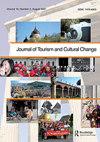研究事件中的性别:关键事件研究中的女性主义视角
IF 2.5
4区 管理学
Q2 HOSPITALITY, LEISURE, SPORT & TOURISM
引用次数: 1
摘要
可以通过各种海外服务学习经验(Feinberg和Edwards)、前往危地马拉并直接与贫困社区的玛雅女编织工合作(Nelson)以及与专家学者一起在中国进行教育导览(Shepherd)来培养具有道德基础的态度和实践。相反,这些案例研究表明,游客(学生和志愿者)表明,他们的行为和态度显然不是世界性的,因为他们更多地是出于自私的私利,而不是帮助、获得新知识和理解差异。坦率地说,世界主义不是积累一堆东西、知识和经验。这是一个理想的、乌托邦式的结构立场,由模棱两可的、关系至上的情感所定义。游客和文化经纪人可能会在复杂的文化空间(掌握多种语言和文化社会政治方式)中穿行,以获得良好的体验或在经济上取得成功,但他们都是粗俗的世界主义者,他们可能真的渴望也可能不渴望谢泼德为本书构建的那种理想的自由世界主义。本文章由计算机程序翻译,如有差异,请以英文原文为准。
Doing gender in events: feminist perspectives in critical event studies
attitude and practice with ethical underpinnings may be cultivated through various servicelearning abroad experiences (Feinberg and Edwards), by going to Guatemala and working directly with Maya women weavers in impoverished communities (Nelson), and by taking a guided educational tour of China with expert scholars (Shepherd). Instead, these case studies demonstrate the tourists (students and volunteers, too) reveal that they are decidedly not cosmopolitan in their actions and attitudes, because they are driven more by selfish selfinterest than helping, acquiring new knowledge, and understanding difference. Frankly, cosmopolitanism is not about racking up a bunch of things, knowledge, and experiences. It is an ideal, utopic structural position that is defined by ambiguous, relational elitist sensibilities. The tourists and culture brokers may navigate complex cultural spaces (knowmultiple languages and cultural-social-political ways) to have a good experience or be to be economically successful, but they are all vulgar cosmopolitans who may or may not actually aspire to the kinds of ideal liberal cosmopolitanism by which Shepherd frames this volume.
求助全文
通过发布文献求助,成功后即可免费获取论文全文。
去求助
来源期刊

Journal of Tourism and Cultural Change
HOSPITALITY, LEISURE, SPORT & TOURISM-
CiteScore
5.10
自引率
9.10%
发文量
31
期刊介绍:
Journal of Tourism and Cultural Change ( JTCC ) is a peer-reviewed, transdisciplinary and transnational journal. It focuses on critically examining the relationships, tensions, representations, conflicts and possibilities that exist between tourism/travel and culture/cultures in an increasingly complex global context. JTCC provides a forum for debate against the backdrop of local, regional, national and transnational understandings of identity and difference. Economic restructuring, recognitions of the cultural dimension of biodiversity and sustainable development, contests regarding the positive and negative impact of patterns of tourist behaviour on cultural diversity, and transcultural strivings - all provide an important focus for JTCC . Global capitalism, in its myriad forms engages with multiple ''ways of being'', generating new relationships, re-evaluating existing, and challenging ways of knowing and being. Tourists and the tourism industry continue to find inventive ways to commodify, transform, present/re-present and consume material culture. JTCC seeks to widen and deepen understandings of such changing relationships and stimulate critical debate by: -Adopting a multidisciplinary approach -Encouraging deep and critical approaches to policy and practice -Embracing an inclusive definition of culture -Focusing on the concept, processes and meanings of change -Encouraging trans-national/transcultural perspectives
 求助内容:
求助内容: 应助结果提醒方式:
应助结果提醒方式:


